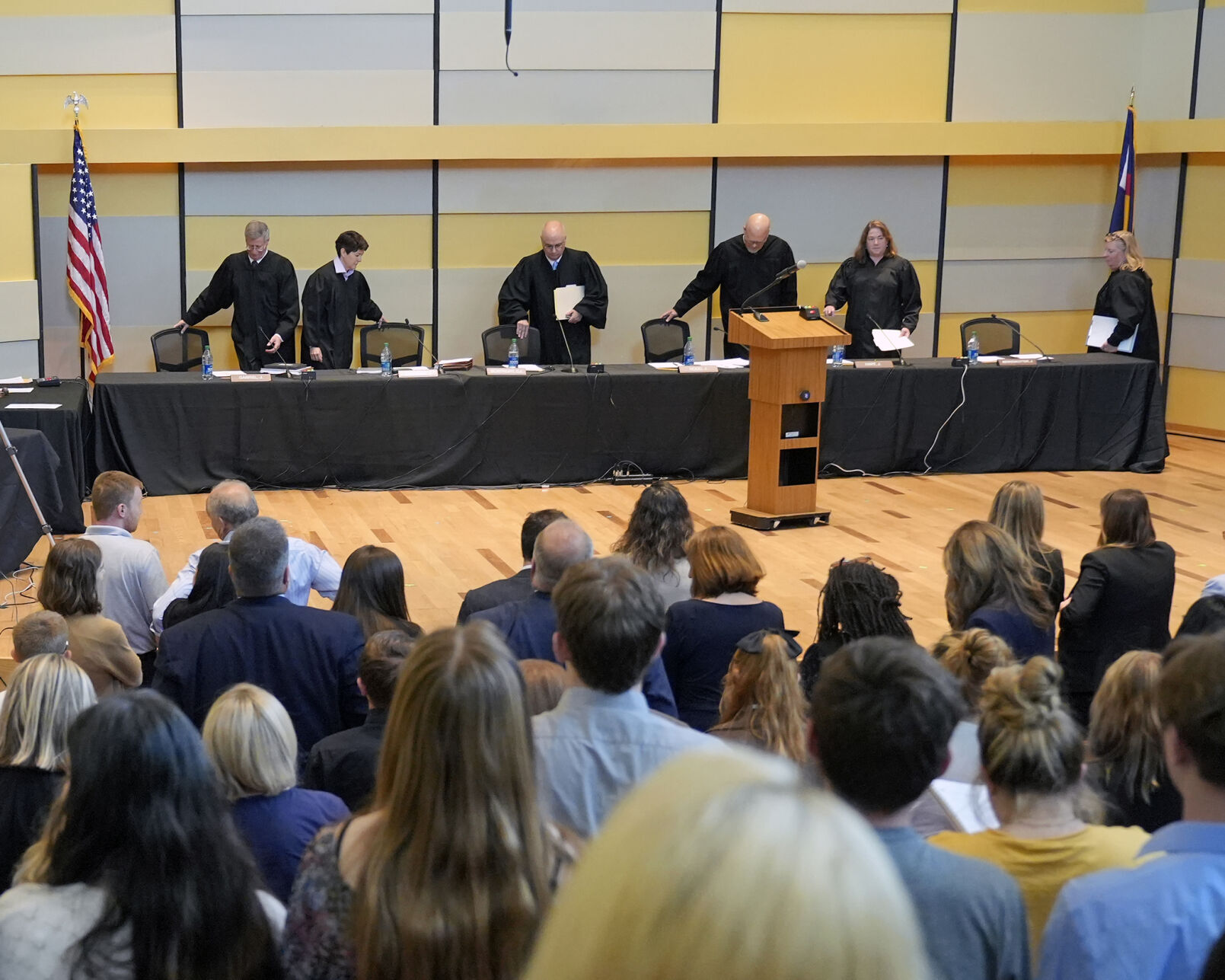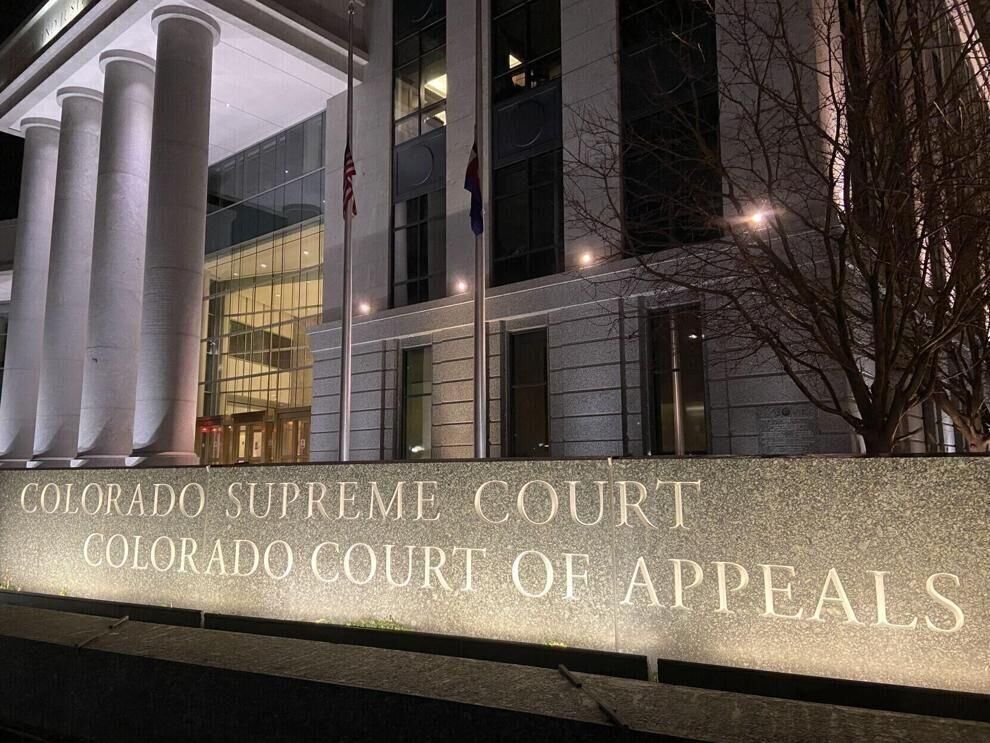Riverbeds, virtual court, sex abuse and more: The Colorado Supreme Court’s biggest decisions of 2022-23 | COVER STORY

The Colorado Supreme Court this week wrapped up its calendar of oral arguments and weekly releases of decisions until the fall, leaving behind a roster of major rulings and edicts affecting the administration of justice.
Chief Justice Brian D. Boatright said at a lawyers-and-judges conference in May that during the past year, the state’s highest court has granted review of fewer cases through the traditional route of certiorari, or “cert,” but has increased the percentage of cases it hears directly from the trial courts, bypassing the Court of Appeals.
At the same time, the Supreme Court has been quicker to process the appeals it hears, which Boatright attributed to better communication between justices about the issues prior to the drafting of an opinion.
“Collegiality is at an all time high. We like each other,” he added.
Colorado Politics compiled a list of the most consequential things the Supreme Court did between September and June – and also, what it notably did not do.
Victims’ rights law goes down
When lawmakers in 2021 enacted a law that would give adult survivors of childhood sex abuse a window to file lawsuits, even if the statute of limitations had long since expired, they knew there was a chance the Supreme Court would find it unconstitutional. Two years later, that was exactly what happened.
The June decision was a blow to victims, many of whom waited until far into adulthood to disclose their abuse and were time-barred from suing their abusers or the institutions that harbored them. The Supreme Court based its conclusion on the constitutional provision barring “retrospective” laws, meaning those that impose fresh liability for past conduct.
The Archdiocese of Denver, which was one of the entities that urged the Supreme Court to strike down the law, said afterward that it “strongly believes litigation is never the means to true healing. It is adversarial and ultimately does more harm than good.”
Meanwhile, advocates for sex abuse survivors indicated victims can still turn to community-based programs for help, and suggested they may pursue other forms of accountability.
“I’m not just looking throughout the constitution. I’m looking to provide an avenue for our sexual abuse survivors who are just now ready for their time in court,” said Rep. Dafna Michaelson Jenet, D-Commerce City, one of the sponsors of the now-void law.

Riverbed ownership remains ambiguous
The Supreme Court had the opportunity to kickstart a process, segment by segment, of determining who owns the beds of waterways criss-crossing Colorado – private parties? Or the state, on behalf of the public?
Instead, the justices rebuffed a challenge by an octogenarian fisherman to declare Colorado the owner of his favorite fishing spot along the Arkansas River.
Critics of the decision lamented a loss of public recreational access by leaving in place the private ownership of riverbeds. Academics pointed out Colorado is the only western state that has not begun to inventory which riverbeds were navigable at statehood and, therefore, public property.
Role of technology clarified for trial courts
The justices took the unusual step early this year of soliciting comments about the livestreaming of criminal cases and the ability to participate virtually in court proceedings of all types. The result was a pair of policies, known as chief justice directives, giving trial judges guidance on how to continue their use of technology now that the immediate public health concerns of the COVID-19 pandemic have largely dissipated.
However, some people viewed the documents as a starting point, rather than the final say. The legislature passed its own livestreaming mandate weeks after the directive was issued, requiring a more expansive approach to broadcasting criminal proceedings. Similarly, advocates for access to justice indicated they would like to see less discretion for trial judges to deny remote participation requests.
“Broad and consistent access to virtual hearings is vital to ensure and expand access to justice for Coloradans in poverty, particularly in rural Colorado and for parties with no access to transportation, no child care, or limited time off from work,” said Matthew R. Baca, executive director of Colorado Legal Services. “We look forward to continuing to engage on this issue to ensure more expansive use of virtual hearings and fair application of this new rule.”
A new profession
In March, the court enacted a framework to create a new profession: licensed legal paraprofessionals. Once the program is in full operation, non-lawyers will be allowed to handle certain aspects of domestic relations cases, an area that includes divorces, custody matters and civil protection orders.
“This is the future of modern practice of law,” said Elisa Overall, executive director of the Colorado Access to Justice Commission.
The aim of the LLP initiative is to enable lower-cost legal representation for litigants, who often represent themselves in consequential civil matters. While Colorado was not the first state to create an LLP license, the profession remains a relative novelty in the U.S.
“We anticipate that the LLP program will be operational by mid-2024,” wrote Justice Melissa Hart to the Supreme Court’s civil rules committee in April.

Financial bullet for counties dodged
Commercial property owners across the state began filing lawsuits after county assessors denied their requests to reexamine and lower their property tax bills for 2020. The owners’ theory was that the COVID-19 pandemic and accompanying public health orders shuttered or severely limited the ability of businesses to operate, entitling them to a mid-year revaluation of their real estate.
Counties pushed back, arguing the property tax assessment schedule is fixed to give local governments predictability in their budgeting. Allowing property owners to demand a revaluation for something as minimal as a routine health department order shutting down a restaurant for a failed inspection could be problematic in practice, they said.
The Supreme Court agreed with the counties, avoiding the potential for a flood of revaluation requests for the 2020 tax year.
Tenant protection upheld
Colorado became the first state this year whose Supreme Court addressed an issue courts across the country have treated unevenly: When Congress enacted a major pandemic relief law in 2020, containing new guardrails against eviction, did it sunset the requirement that tenants in federally supported housing receive 30 days’ notice before an eviction? Or is that requirement still in effect?
It remains in effect, the justices ruled in May, to the delight of tenant advocates.
“There is a significant power imbalance in our housing system that tilts heavily in favor of landlords at the expense of lower income renters,” said Diane Yentel, president and CEO of the National Low Income Housing Coalition. “This decision by the Colorado Supreme Court solidifies an important tenant protection.”

New requirement for first-degree murder
Colorado lawmakers abolished the death penalty in 2020, but the state constitution and multiple laws still make reference to “capital offenses.” In particular, the constitution denies bail to those charged with capital crimes where there is sufficient evidence of guilt.
In June, the Supreme Court agreed that because capital punishment does not exist anymore, there are no “capital offenses” post-2020 and even those accused of first-degree murder are eligible for bail. Consequently, district attorneys’ offices are now reviewing cases originally designated, incorrectly, as “no bond.”
“That’s had an immediate impact,” said Denver District Attorney Beth McCann, whose office is attending multiple bond hearings for first-degree murder.
Right to counsel – to a point
While courts have recognized the right of criminal defendants to hire an attorney of their choice, if they can afford to, it was not clear in Colorado whether an indigent defendant with a court-appointed lawyer has a right to go to trial with that same attorney. By 6-1, the Supreme Court said no.
In a pair of cases, the court’s majority agreed trial judges can force a last-minute substitution of public defenders by refusing to postpone a trial and requiring new attorneys to pinch hit, with as little as 72 hours’ notice. The majority conceded, though, that defendants do have an “interest” in keeping the same attorney.
“This was a deeply regrettable decision and we hope it is not the end of the battle on that issue,” said James Hardy, executive board co-chair of the Defenders Union of Colorado and a longtime appellate public defender, speaking for himself and not for the public defender’s office.

Questioning alternate suspects
By 4-3, the Supreme Court gave criminal defendants who are wrongfully accused another tool to advance their innocence: the ability to question an alternate suspect in front of a jury when the person has some credible connection to the alleged crime.
In the case at hand, there was only one tangible piece of evidence linking the convicted defendant to a burglary scene, but substantial evidence suggesting the victim’s niece was actually responsible. Even the victim believed so. But the jury never saw the alternate suspect take the stand.
Allowing jurors to watch an alternate suspect invoke their constitutional right against self-incrimination in response to questioning generates “a powerful implication for the jury,” said defense attorney Meredith O’Harris. “This case will help keep our prosecutors honest and prevent wrongful convictions.”
Racial bias in jury selection still pending
Meanwhile, the legal community is still waiting to see if the Supreme Court will enact stricter requirements governing when parties – particularly prosecutors – may dismiss people of color from jury pools in criminal trials. The court held a public hearing in February on a proposal to combat implicit racial bias in jury selection, but the rule change remains in limbo.
Prosecutors uniformly opposed making it harder to, for example, excuse a juror of color who expresses distrust in law enforcement. Defense attorneys and trial judges who testified noted the existing legal standard continues to enable the dismissal of jurors for reasons that, while not explicitly racial, still correlate with race.














